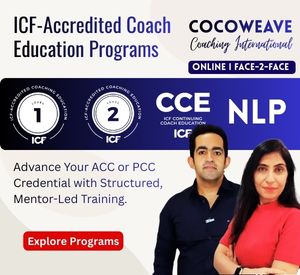Let me start with an honest confession: straddling the domains of strategy consulting and leadership coaching offers me an excellent opportunity to migrate frameworks from one domain to the other. Effectively, both strategy consulting and coaching work on change, one at an organizational level and the other at an individual level. Hence, the possibility of adapting frameworks from one to the other always exists.
After exploring two such frameworks in the earlier articles published on Coaching World, “Think RFM for Behavior Change” and “Six Thinking Hats – A Great Coaching Framework,” now I explore the Playing to Win, one of the most frequently used strategy frameworks. This framework is built around the strategic approach adopted by Procter and Gamble’s former CEO A.G. Lafley and his strategic adviser Roger Martin.
At the heart of the Playing to Win framework are five essential and tightly integrated strategic choices that can help organizations create a playbook for winning against competition. These strategic choices center around:
- Winning aspiration: The purpose of the enterprise, its guiding aspiration.
- Where to Play: The playing field to compete in
- How to win: Value proposition and competitive advantage
- Capabilities: Set of reinforcing activities and specific configuration of capabilities
- Management systems: Systems, structures and measures to support the above choices
So, how can this framework be used to create winning strategies for our coaching clients?
Coaching is all about insightful and powerful questions. The questions that we can structure around the five ‘strategic’ choices will help generate awareness, stroke creativity, and lead to creation of an action plan by the leaders we coach.
Winning aspiration
It all starts with an aspiration to win and defining what winning looks like. Aspiration is the fuel that ignites the spark of change.
This is all about crafting aspirations that resonate deeply with the coaching client. Help the client discover their winning aspiration with questions such as:
- “What would you want your ideal self to be?”
- “What kind of a person/leader would you like to be?”
- “If you were to get up one morning to be the person you have always wanted to be, what would you be like?”
Where to play
The choice of where to play is about choosing the right playing field for change. As it is said, we can’t have it all. Therefore, choosing where to play also means choosing where not to play. If the client continues to have everything as a priority, then nothing is a priority. Help them decide which battles of change they want to fight now and which ones they may wish to leave for later. Sometimes, this could be about asking things like
- “What will you need to focus on to realize your ‘winning aspiration’?”
- “What are you willing to forego to win what you aspire?”
- “What are you currently doing that is not giving you commensurate returns on your time and efforts? “
How to win
This step in the coaching context would be about helping the client discover their inherent strengths and devising their own unique ways to achieve what they want. This phase is all about the client creating new “how-to-win” choices, especially when they see none. You might ask questions like:
- “What are the strengths and resources that you have which could help you win?”
- “How will you create an ideal winning solution for yourself?”
- “What would you try now if you knew you could not fail?”
- “What rules of the game could help you win?”
Capabilities
This strategic choice is about understanding the capabilities and resources that need to be built in order for you to play to win. Help the client capture the most important activities required to deliver on their “where-to-play” and “how-to-win” choices. Generate awareness with questions such as:
- “What capabilities will you have to retain or attain to win?”
- “What is your world of tomorrow going to need you to do today?”
- “Which are those few actions that you will need to take today and every day?”
- “What small steps can you take to get you closer to your vision?”
Systems and measures
What you measure is what gets improved. Nudge the client to define how they are going to keep track of the inputs and outputs. Ask them:
- “What is the system you intend to put in place to remind you of the tasks you need to do constantly?”
- “How are you going to keep track of where you are with respect to your winning aspiration?”
- “How are you going to break up your winning plan into milestones?”
- “How are you going to hold yourself accountable?”
If there is anything more important than the will to win, it is the will to prepare for a win!
@2021 by Sandeep Jain, Value-Unlocked
Disclaimer
The views and opinions expressed in guest posts featured on this blog are those of the author and do not necessarily reflect the opinions and views of the International Coach Federation (ICF). The publication of a guest post on the ICF Blog does not equate to an ICF endorsement or guarantee of the products or services provided by the author.
Additionally, for the purpose of full disclosure and as a disclaimer of liability, this content was possibly generated using the assistance of an AI program. Its contents, either in whole or in part, have been reviewed and revised by a human. Nevertheless, the reader/user is responsible for verifying the information presented and should not rely upon this article or post as providing any specific professional advice or counsel. Its contents are provided “as is,” and ICF makes no representations or warranties as to its accuracy or completeness and to the fullest extent permitted by applicable law specifically disclaims any and all liability for any damages or injuries resulting from use of or reliance thereupon.
Authors
Post Type
Blog
Audience Type
Coach Educators, Experienced Coaches, External Coaches, ICF Chapter Leaders, Internal Coaches, New Coaches, Professional Coaches, Team and Group Coaches
Topic
Advance Your Coaching Career, Discover - Your Coaching Career
Related Posts
The Power of Active Listening in Meaningful Coaching: Why Active Listening is the Most Essential Coaching Competency
Of all the foundational coaching competencies identified by the International Coaching Federation…
Allyship in Action: Coaching as a Catalyst for Change
Allyship is often framed as a value or an intention. In practice,…
Grace Under Fire: Building Stress Resilience for Coaches and High Achievers
There’s a unique kind of pressure that lives at the intersection of…







